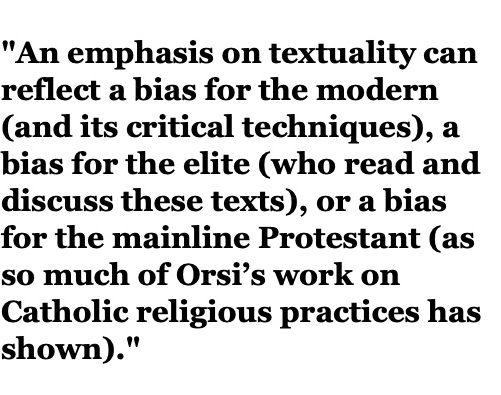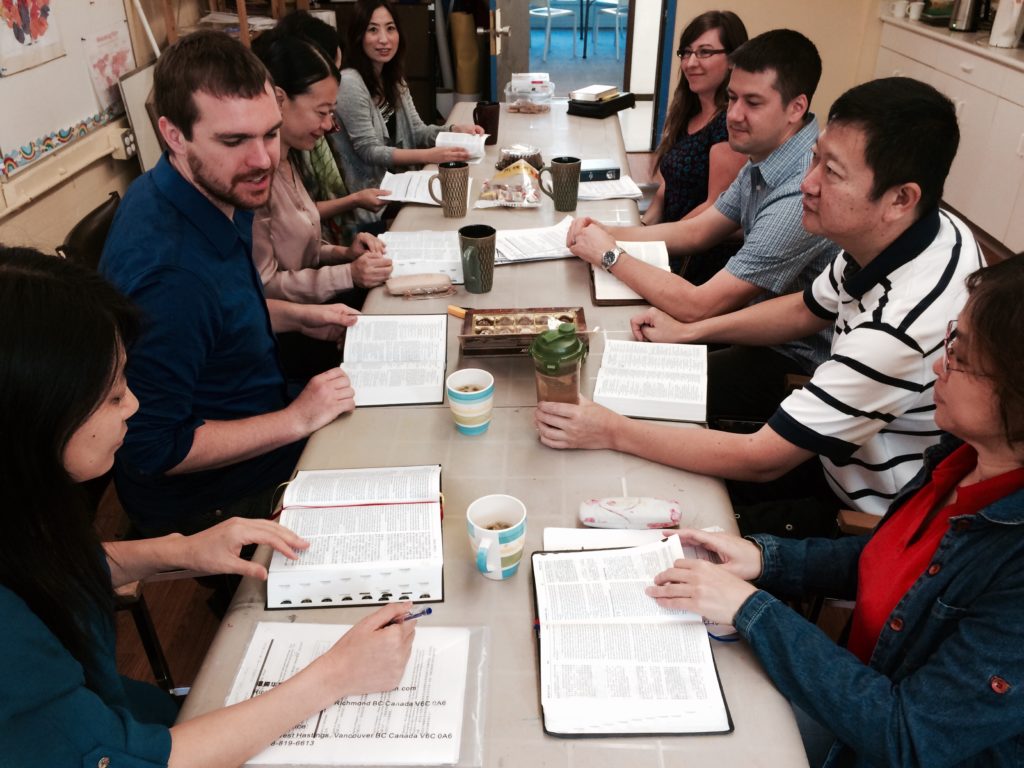
In the last sentence of Robert Orsi’s recent post on the Contending Modernities blog, he confesses to worrying about an Ohio woman killing “us all.” What has she done during this pandemic to elicit his worry, apparently more than any politician or sneezer might have done? She gained a short-lived viral fame for saying, in a report filed to CNN by its reporter Gary Tuchman, that she was not concerned about her health because she was “covered in Jesus’s blood.” We might be able to reason with a politician who utters falsehoods for political gain, for example by showing evidence that got Mitch McConnell to confess that he had lied in saying that the Obama administration had left no pandemic guidelines when Donald Trump became President of the US. I might be able to turn to etiquette when confronted with a sneezer in the baking aisle of the grocery store, noting that we customarily turn away from others when we sneeze. But for Orsi, there is no commonality with the woman covered in Jesus’s blood. She is far from us scholars; she lives in a radically different ontological reality; we scholars should not delude ourselves that we could have any power with which to pathologize her difference; we should not fantasize about becoming “deputies of law and order” who could get our fellow citizens to judge her as we deem appropriate.
I, for one, am not particularly worried about this specific woman killing me. I live far from her. She most likely has no desire to visit Leon County in Florida. I have no desire to travel to Monroe, Ohio, near the border between Warren and Butler counties—both located between Cincinnati and Dayton—where Tuchman interviewed her as she departed from the Solid Rock Church. (In the wake of Tuchman’s story, Solid Rock Church has posted guidelines for worship during the pandemic.) I feel fortunate, at present, that we both live in counties—assuming that she lives in either Warren or Butler county—that have a fairly low number of positive cases and deaths per capita. I am happy to learn, as I write this, that her area has not recently seen an increase in the rate of daily new cases. No matter how much confidence these facts give me that I will not soon die as a result of something that has its origin in virus-laden droplets that she will emit, these facts might not mean much. An outbreak may start in the future no matter what the current statistics say, and our relatively good fortune should not preclude us from caring for and worrying about our fellow citizens in the many many counties in the US that have higher rates, or the sick in counties with lower rates than ours.
Nevertheless, I am worried for this woman’s neighbors, since Butler County was the site of a recent rally against Ohio’s governor Mike DeWine and the director of Ohio’s Department of Health, Dr. Amy Acton. Such distrust of political and public-health leadership that was universally praised in early April may very well kill Ohioans in the future. Solid Rock Church’s guidelines for worship close with an affirmation of gratitude for Acton’s and DeWine’s leadership, and pray for their “continued wisdom.” Given this affirmation, I wish that Tuchman would return to that congregation, and ask people there for their thoughts about the rally organizers and attendees in Butler County. That would be more productive than Tuchman’s modeling what we now know to be bad public-health guidance, by sensationalizing the brief hugs that members of Solid Rock Church gave each other at the entrance to their church. After all, the risk that they run of becoming infected has to do with the length of time that they spend in each other’s vicinity, especially indoors.
In the midst of this pandemic, I am the sort of person who thinks about statistics and practical concerns (how long is too long for me to spend in the grocery store?). My pearl-clutching thoughts about religion and its dangers are not any greater in quantity or intensity at this moment than they were before the pandemic started. This is perhaps an odd temperament for a professor in a religion department to confess. Shouldn’t I be thinking about religion all the time? Shouldn’t I be thinking about it more deeply when matters of life and death are at stake? But perhaps I might justify this temperament by explaining why, at the same time that I do not understand the religious life of the woman in Ohio who is far from me, I neither feel a secure hold on the story that Orsi—a scholar whom I take to be close to me (whenever I feel a need for happy memories of my late fiancé, invariably among them is a morning when he made breakfast for Orsi)—tells about plural ontological realism, and his implication in that story that there is nothing for scholars to do except proclaim a need for, and develop, “new ways of thinking.”

In reading various friends’ reactions on social media to Tuchman’s CNN piece, I am continually surprised that attention has fixed on the white woman who says that she is covered in Jesus’s blood. While Orsi mentions that nonwhite evangelicals say similar things, no one in my networks has turned to the African American woman in Tuchman’s story who, almost ninety seconds into the story, says “The blood of Jesus cures every disease! Psalms 91—read it!” This is perhaps one of the key moments of biblical prooftexting in recent media stories on religion. And certainly, that woman is reading the plain sense of the psalm correctly; those who trust in God (and follow God’s commands) will see themselves as the addressees of the verses in that Psalm (91:9–11) that claim that “because you took the Lord … as your haven, no harm will befall you, no disease touch your tent. For He will order His angels to guard you wherever you go.”
This woman’s worldview is biblically grounded. There is nothing prima facie wrong with her calling herself a Christian, holding Psalm 91 to be sacred, and holding membership in a church that affirms “divine healing of the sick.” Yet we should hesitate before continuing to say that Psalm 91 expresses the essence of the biblical worldview. The blood of Jesus may indeed have ontological properties that cure every disease, but it is the epistemological story about this cure—about how a woman might come to know for certain that she is covered in it, about how she might come to know that it will either heal her or prevent her from contracting illness—that is more vexing for the Christian than the ontology of disease. As Paul says in the complex argument of Romans 3, it is both true for the Christian that “there is no one who is righteous, not even one; there is no one who has understanding” (Romans 3:10–11, restating the early verses of Psalm 14) at the same time that the true Christian is “justified by [God’s] grace as a gift, through the redemption that is in Christ Jesus” (Romans 3:24). Without understanding, how can one know that one has received the divine grace that will lead one to be cured of any disease that one might contract? How could one say with any command of fact that one is bathed in Christ’s blood? Elsewhere, Paul writes that the peace of God “surpasses all understanding” (Philippians 4:7). But is not such understanding precisely what the members of Solid Rock Church claim to possess?

Where is the secure grasp of ontology, for the Bible-believing Christian? How is it evident? It would seem that the extent of human sinfulness would make it impossible to know for certain whether one is covered in Jesus’s blood, or in a placebo. The Bible opens up plural ontological realities, but it also opens up the possibility for skepticism about (but not dismissal of!) the ontology to which one is committed.
This skeptical space ought to be common to me, to Orsi, and to the churchgoers interviewed by Tuchman. We each may arrive at it through different paths—Orsi and I through the university curricula, the churchgoers through the Biblical text—but it is shared nonetheless. It allows Orsi and me to judge these churchgoers, to be the “deputies of law and order” that Orsi fears we cannot be. It allows these churchgoers to be deputies and judge Orsi and me as well; neither being an insider in a community nor being an outsider is sufficient to make one’s claims correct.
To the extent that North American undergraduates know Orsi’s published work, it is likely that they know his critique of Dennis Covington’s Salvation on Sand Mountain for arbitrarily positioning Covington hierarchically above the snake-handling preacher Punkin Brown, with whose community in northeastern Alabama Covington spent almost two years in the early 1990s. Orsi’s response to the Ohio woman displays more anxiety than his response to Covington, but both share a commitment to the belief that “the point of engaging other religious worlds should not be to reassure ourselves and our readers that we are not them” (192). With this I agree. But Covington had reasons for suddenly judging Brown negatively. Covington gave a sermon in that community that endorsed women’s equality, and cited Mark 16, in which the risen Jesus first appeared to Mary Magdalene, as evidence for this view. For this, a member of the community tells Covington that he is “out of the Word,” and Brown agrees. It is at this point that Covington turns to his othering of Brown that “makes the world safe again for Covington and his readers” (100). Nevertheless, Mark 16 says what it says, although it is also the case that its narrative is not quite paralleled in the other Gospels. To point this out is not to reassure myself that my ontology is right. It is to point to the difficulty of finding a secure footing in a tradition, whether one takes that tradition as reporting on an ontologically true reality (as Covington and Brown do) or an ontologically false one (as I do).

One can think of secular versions of this story as well. In his 1993 book A Place Among The Nations (reprinted with some changes in 2000 as A Durable Peace), Israeli Prime Minister Benjamin Netanyahu clearly places himself in the tradition of the Revisionist Zionist Vladimir Jabotinsky, whom Netanyahu describes as almost a lone seer in comprehending the importance of Jewish military power (359). Yet in his own writings, Jabotinsky saw Jewish power in Palestine as something that would cause moderate Arab voices to emerge, and peace with them (43). Almost a century later, one has the right to ask those who claim Jabotinsky as an intellectual forebear why there is as yet no peace. Was Jabotinsky wrong about the Palestinian Arabs (as Netanyahu’s anti-Arab racism in A Durable Peace implies), or was he wrong to believe that Jewish power would generate peace (as the fact of the passage of almost a century implies)? What would be the criterion for deciding between these two options? How would one know that it is the correct criterion? Here too, the ability to engage in immanent critique leads ontological security to recede as one grasps for it.
Nowadays, scholars of religion are not always scholars of texts. There are good reasons for this. An emphasis on textuality can reflect a bias for the modern (and its critical techniques), a bias for the elite (who read and discuss these texts), or a bias for the mainline Protestant (as so much of Orsi’s work on Catholic religious practices has shown). As a lapsed Catholic who studies Jewish philosophical texts, I am wary of replicating these biases in this response to Orsi. Nonetheless, if Orsi is wondering how to respond to the threat that he sees in the Ohio woman and her ontological reality, I suggest that he turn not to a new way of thinking, but to an old way of being with a believer, with a text that the believer takes to be sacred. If he were to offer to read the Bible with her—asking her questions about the text, letting her ask him questions, allowing the far to become close—the fragility of both of their ontologies might very well come to the surface.

Or it might not. This conversation, were it to happen, could collapse after a few moments. She might show herself to be irresponsible: perhaps by refusing to see other justifiable readings (even if she does not commit herself to their truth), perhaps by refusing to wear a facemask with Orsi if he were to ask her to do so. So be it. As Max Weber wrote in “Science as a Vocation” (recently retranslated as “The Scholar’s Work”), the role of the teacher, in a time when multiple values collide against one another in a sort of “polytheism,” is to show the effects of some commitment or other “on social conditions and people’s lives” (27). This makes it possible for the listener to take responsibility for one’s commitments by gaining a clear knowledge of the full range of their consequences (36). Whether one sees the teacher as Orsi or as the Ohio woman, the possibility of being judged as an irresponsible student (failing to read, failing to take seriously the wages of sin) is always possible. Cultural politics is a matter of trying to persuade my fellow citizens that this other person is irresponsible, and not I.
Orsi is correct to note that death is at stake. Even if the Ohio woman will not kill me or “us all,” people have died in the past due to others’ irresponsibility. Hundreds have died today, and many more will surely die in the future. In the midst of all that death, I choose to wager that some respite—perhaps more than I might dare to hope—can be found in studying a complex text with another.
The author is deeply grateful to Ryan Donovan, Joshua Lupo, Atalia Omer, and Jason Springs for their comments on previous drafts, as well as to Robert Orsi for the integral role he plays in a happy memory.

